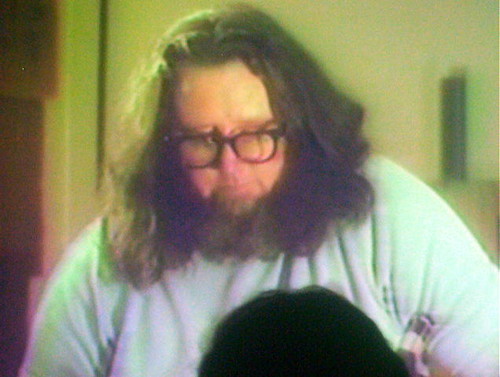In my note on Paul Auster’s poetry the other day, I wrote:
Auster’s work looks on its surface a little like New York School verse, especially of the uptown Columbia variant that looked more to Ron Padgett & John Ashbery than, say, to Ted Berrigan (who, so far as I’m aware, never published any translations¹).
The footnote admitted that “This virtually is an invitation to be corrected, and I’d love to be.” Several people wrote in, either via the comments stream or via email, including (among others) Jordan Davis, Tinker Greene, Ron Horning & Anselm Berrigan, pointing to a variety of instances of translation in Ted Berrigan’s work. What follows is a synthesis of these comments.
There is a translation of Rimbaud’s Le Bateau ivre published by Adventures in Poetry with illustrations by Joe Brainard under the title The Drunken Boat that is also the basis for many lines throughout The Sonnets, especially the first I-VI and LXXIV. There are at least eight copies of this side-stapled mimeo volume currently available in used or rare book shops in the U.S., the very least expensive of which is $110.
Life of a Man is collected in the In the Early Morning Rain section of the Collected Poems tho it first appeared in Bean Spasms. The notes to the Collected characterize this sequence as “transliterated from Giuseppe Ungaretti’s Vita di un uomo.” The version in the Collected contains two poems not in Bean Spasms while dropping two others. In Nothing for You is a translation from Rilke called “Autumn’s Day.” Tinker Greene typed the whole thing into the Auster note comments stream.
In Easter Monday is a translation from Leopardi done as a collaboration with George Schneeman & Gordon Brotherston. There is another collaborative translation with Brotherston in the Collected, in a section right near the end entitled A Certain Slant of Sunlight Out-Takes is “Der Asra,” a working of Heinrich Heine’s poem of the same name. A chapbook of eight collaborative translations Berrigan & Brotherston did together is apparently in the works, under the title Water Under the House. In addition to these two poems I am told that there is a work by Neruda in that collection.
Compared with, say, Ron Padgett or Anselm Hollo, this is not a vast quantity and in some ways this is surprising. Translations invariably are a mode of forced collaboration, not just for the translated poet but for the translator as well. And Berrigan was easily the most collaborative poet of his generation – indeed many of our accepted ideas about what collaboration is can be traced directly back to Berrigan’s practice and the huge influence it has had over the last four decades. What we can say about the translations here is that they’re of poets who were already canonic before Berrigan got to them & that he’s very much following the Poundian model of using the process to access different modes of being. This is nowhere more true than in Life of a Man, in which the ex-GI Berrigan writes through the Italian poet of World War I. Further, as a Jew born in Alexandria, Egypt & raised partly in Paris, Ungaretti’s own relationship to his family’s ancestral home of Lucca is at least as complicated as that of the relatively unlettered Berrigan thrown in with all the Ivy-League graduates-turned-art-critics who populated the New York School.
Perhaps Adventures in Poetry should reissue The Drunken Boat. I’ve heard two people in the past week claim it to be second only to The Sonnets among Berrigan’s achievement & tho I’m a “late poem” guy myself, I take that as a serious claim. The other obvious book that should come out – I would be surprised to discover that nobody’s working on this – is a Collected Collaborations. Now that will be a volume to conjure by.






